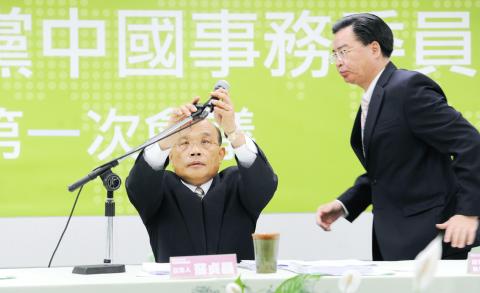The Democratic Progressive Party (DPP) took the first step toward the formulation of its cross-strait policy as its nine-member China Affairs Committee held its first meeting yesterday in the face of mounting cross-strait challenges.
“Almost every member of the committee agreed that the DPP’s core values have withstood the test of time and changing political situation. Discussions over strategic options and substantial policies are what this committee has to accomplish in the future,” committee spokesperson Cheng Wen-tsan (鄭文燦) told a press conference.
The two-hour meeting gathered all the committee members, namely committee convener and DPP Chairman Su Tseng-chang (蘇貞昌), former DPP chairperson Tsai Ing-wen (蔡英文), former premier Frank Hsieh (謝長廷), Greater Kaohsiung Mayor Chen Chu (陳菊), former premier Yu Shyi-kun, DPP legislative caucus whip Ker Chien-ming (柯建銘), Greater Tainan Mayor William Lai (賴清德), former National Security Council secretary-general Chiou I-jen (邱義仁) and former DPP secretary--general Wu Nai-jen (吳乃仁).

Photo: Lo Pei-Der, Taipei Times
Chen Ming-tung (陳明通), a National Taiwan University professor who served as Mainland Affairs Council chairman under the DPP administration, gave the keynote speech, “Taiwan’s China agenda.”
In it, he highlighted a “Taiwan Dream” based on the Taiwanese people’s high degree of consensus on sovereignty, security, human rights and economic benefits, Cheng quoted Chen as saying.
Underlining the hierarchy of the DPP’s cross-strait policy, Chiou said the party should be able to assess its basic position, strategic options and policymaking to counter persistent challenges from Beijing, Cheng said.
Former premiers Yu and Hsieh, who hold very different attitudes toward China, both laid out their main ideas in the meeting, with Yu saying that he would support any policy as long as it does not harm national interests and does not violate the DPP’s Resolution on Taiwan’s Future (台灣前途決議文) and its Normal Country Resolution (正常國家決議文).
Hsieh, who did not join the committee until this week, played down the differences between his moderate China policy and other members’ more hawkish positions, saying that the only difference between them could be his initiative of “constitutions with different interpretations (憲法各表).”
While the spokesperson said the atmosphere of the meeting was generally convivial, a DPP member who was at the meeting said on condition of anonymity that Chiou argued with Hsieh about the DPP’s attitude to the Republic of China (ROC) Constitution.
Chiou said the DPP does not accept the ROC Constitution in its entirety, while Hsieh believed the opposite, the source said.
The committee’s second meeting is scheduled for July 11, DPP Department of China Affairs director Honigmann Hong (洪財隆) said, adding that the meetings would be held every two months.

CHAOS: Iranians took to the streets playing celebratory music after reports of Khamenei’s death on Saturday, while mourners also gathered in Tehran yesterday Iranian Supreme Leader Ayatollah Ali Khamenei was killed in a major attack on Iran launched by Israel and the US, throwing the future of the Islamic republic into doubt and raising the risk of regional instability. Iranian state television and the state-run IRNA news agency announced the 86-year-old’s death early yesterday. US President Donald Trump said it gave Iranians their “greatest chance” to “take back” their country. The announcements came after a joint US and Israeli aerial bombardment that targeted Iranian military and governmental sites. Trump said the “heavy and pinpoint bombing” would continue through the week or as long

TRUST: The KMT said it respected the US’ timing and considerations, and hoped it would continue to honor its commitments to helping Taiwan bolster its defenses and deterrence US President Donald Trump is delaying a multibillion-dollar arms sale to Taiwan to ensure his visit to Beijing is successful, a New York Times report said. The weapons sales package has stalled in the US Department of State, the report said, citing US officials it did not identify. The White House has told agencies not to push forward ahead of Trump’s meeting with Chinese President Xi Jinping (習近平), it said. The two last month held a phone call to discuss trade and geopolitical flashpoints ahead of the summit. Xi raised the Taiwan issue and urged the US to handle arms sales to

BIG SPENDERS: Foreign investors bought the most Taiwan equities since 2005, signaling confidence that an AI boom would continue to benefit chipmakers Taiwan Semiconductor Manufacturing Co’s (TSMC, 台積電) market capitalization swelled to US$2 trillion for the first time following a 4.25 percent rally in its American depositary receipts (ADR) overnight, putting the world’s biggest contract chipmaker sixth on the list of the world’s biggest companies by market capitalization, just behind Amazon.com Inc. The site CompaniesMarketcap.com ranked TSMC ahead of Saudi Aramco and Meta Platforms Inc. The Taiwanese company’s ADRs on Tuesday surged to US$385.75 on the New York Stock Exchange, as strong demand for artificial intelligence (AI) applications led to chip supply constraints and boost revenue growth to record-breaking levels. Each TSMC ADR represents

State-run CPC Corp, Taiwan (CPC, 台灣中油) yesterday said that it had confirmed on Saturday night with its liquefied natural gas (LNG) and crude oil suppliers that shipments are proceeding as scheduled and that domestic supplies remain unaffected. The CPC yesterday announced the gasoline and diesel prices will rise by NT$0.2 and NT$0.4 per liter, respectively, starting Monday, citing Middle East tensions and blizzards in the eastern United States. CPC also iterated it has been reducing the proportion of crude oil imports from the Middle East and diversifying its supply sources in the past few years in response to geopolitical risks, expanding